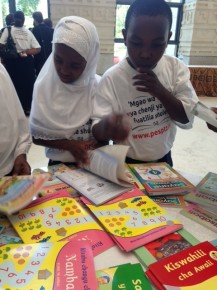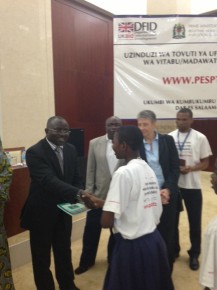
The Tanzanian government launched a new website last week to establish a monitoring system to 'crowd source' oversight of a huge logistical exercise that is now underway. DFID Tanzania has been assigned the task of supporting the Tanzanian government to purchase and distribute millions of textbooks using £29.5 million of funds – see my post from last year where I asked for help on how to do this!
An MoU signed in March 2012 by the UK and Tanzanian governments, BAe Systems and the UK Serious Fraud Office has resulted in around 19 million books been procured and are now being distributed to more than 16,000 public primary schools, along with school desks and chairs. DFID are providing expert advice on procurement and financial management to Tanzania’s Prime Minister’s Office – Regional Administration and Local Government who manage the tendering process. This has also allowed competitive prices to be achieved and improved value for money.
The Primary Education Support Project website, which was developed by Tanzanian company Datavision, was launched by Zuberi Samataba, Deputy Permanent Secretary of the Prime Minister’s Office Regional Administration and Local Government. He presented sample textbooks to students and answered questions from the media who widely broadcast the news of how to use the website, including an SMS hotline, throughout Tanzania.
The website enables easy monitoring and provision of feedback via website comments, SMS or phone call-back on any deviations from the detailed delivery plans, which are based upon school enrolment data. It also seeks to promote mutual accountability amongst different actors, including the publishers, government, civil society organisations, media, parents and community members.

The site has already got a tentative 'thumbs up' from the mtega blog, that critiques the approach to transparency and would like to see improvements and more information online about the actual financial settlement reached. The civil society organisation TWAWEZA plans to use the data available to make checks at 150 schools. Their findings should make interesting reading, as will how disputes get resolved between schools, government and the publishers supplying the textbooks.
With the launch of this system, Tanzania's portfolio on implementing the Open Government Partnership will be enhanced with detailed information available online. DFID Tanzania is working in collaboration with the World Bank to support the country's OGP commitments and action plan.

4 comments
Comment by Jean Van Wetter posted on
Great initiative, Ian.
VSO Tanzania is also willing to make cross-checks with schools in Kagera.
Comment by Lily Nyariki posted on
Hi Ian. Interesting to read of what difd and the government of tanzania are doing to get books to schols. As their advisor, are you aware that there is what is refrred to as the book chain? What is your experience like working with the book chain? In Kenya it works perfectly and in the long run it will ensure sustainability in both the education and book sectors. Your approach to getting books to schools may seem 'cheap' because you left out booksellers BUT in the long run, you are killing the entire book industry in Tanzania.
Comment by Ian Attfield posted on
Hi Lily,
THanks for your comment and query on why no use of the 'book chain' in this case.
Well prior to my arrival I Tanzania in mid 2012, the decision had already been made for the funds to be directly routed to the government of Tanzania and for te government to purchase from the publishers. Given the very large volumes (around 19million books), this stock would always have to be ordered in bulk and by doing so drive for competitive prices. Previously I worked in Zimbawe where a similar process saw book prices fall by a factor of 5. As is often the case lack of competition and inefficient markets resulted in poor value to the funders, schools and children.
Booksellers and publishers around the world are having to adapt to disruptive technologies and new media distribution approaches, I'm afraid Tanzania is no exception to this trend.
Comment by Ian Attfield posted on
Jean,
thanks for kind offer, looking forward to hearing the findings!
Ian